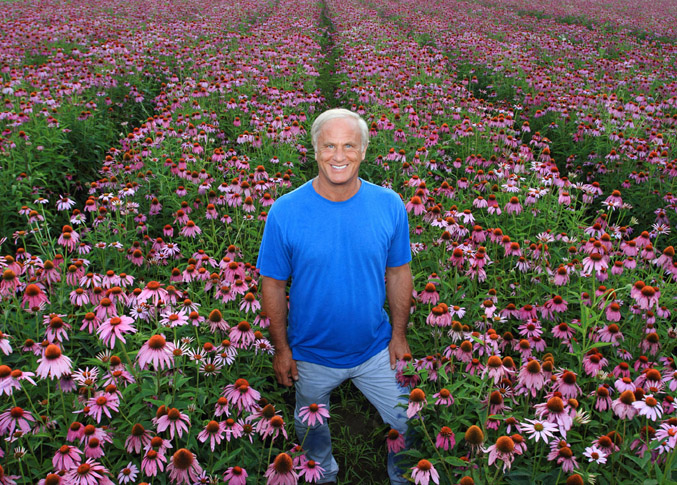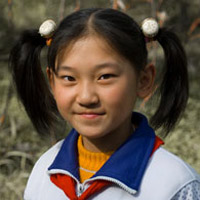
Ric Scalzo in a field of Echinacea at Gaia’s organic farm in Brevard, North Carolina. Photo by Bill Tipper
 “I’m on the board of directors for Golden Courage International for girls and boys forced into prostitution at a very young age. It’s really emotional for me. The primary objective is to give them a second chance—through courage, hope, safety and education.” - Ric Scalzo
“I’m on the board of directors for Golden Courage International for girls and boys forced into prostitution at a very young age. It’s really emotional for me. The primary objective is to give them a second chance—through courage, hope, safety and education.” - Ric ScalzoRichard "Ric" Scalzo, the pioneering president and CEO of Gaia Herbs, has been making fine sustainable products and setting industry standards for plant medicine education and advocacy for 25 years. One of North America's most respected herbalists and botanical researchers, this visionary ecopreneur is now focusing his considerable energy on teaching children in developing countries about sustainable living. I sat down with Scalzo at the annual Medicines from the Earth Symposium in the Blue Ridge Mountains of North Carolina where he is instrumental in bringing together leading herbalists, ethnobotanists, naturopaths and students to share, love, laugh and learn.
What does the name Gaia mean?
The name comes from Greek and Sanskrit traditions, and in both cases implies Mother Earth. Gaia means all of life on earth being interconnected and in a constant state of abundant interdependence and co-evolution.
What was the original concept?
Gaia was originally called Elixirs of Life, with a foundation based in Ayurveda. We took seven different organ systems and developed a rejuvenating constitutional tonic for each of them.
What was Gaia's first offering?
Fine extracts of ginkgo and echinacea, which I sourced from my network of herbalists. I got a grinder and a special press designed by a machinist, and we launched a new concept: herbal extracts with the full vital force of the fresh plant. Competitors at the time were making tinctures from dry herbs, so this was new.
Your reputation for staying true to your core values is legendary.
The overall core values of the company haven't really changed. They're fundamentally solid. They're based on the holistic principles of naturopathic medicine: Work with the powers of nature. Do not harm, and by do no harm we mean no harm to plants and planet and people and animals. Teach and inspire others.
What is most important to you now?
At this point in my career, my thoughts have shifted to how I can give back, and this seems to involve children. I don't know if I've missed my opportunity to have my own kids, but at this point I don't have any. So kids become an important focal point for me.
You have all this fabulous fathering energy.
Gaia has always been involved in some project to support kids. We started a school in Jamaica about 20 years ago, and it led to projects in Costa Rica and China. Locally, through our GaiaKids Farm Field Day program, I get to teach kids about organic farming and the role of bees on the farm and give them samples of wildflower honey. That's pretty magical.
Tell me about Costa Rica.
Through The Center for Sustainable and Environmental Learning in Costa Rica, we've developed an experience learning, off-the-grid semester program for high school students from all over the world to learn how to take care of the planet. We bring in leading experts as teachers and they mentor kids. Teenagers are a bundle of work but a lot of fun. They're forming ideas and making choices of their own, and I love that.
Tell us about your China project.
I'm on the board of directors for Golden Courage International which is for girls and boys who have been forced into prostitution at a very young age. It's really emotional for me. I get tears even talking about it. We have to go to the pimps and buy the kids. The primary objective is to give them a second chance -- through courage, hope, safety and education.
What happens to these kids after they graduate?
I'm leading the development of a for-profit organic farming venue to help create an opportunity for these kids to have employment after they graduate. So they can learn to grow high quality organic medicinal plants. The Chinese government has given millions of dollars and has donated hundreds and hundreds of acres of green land that has never been touched with chemicals. They've built a dormitory and a school, and the kids eat really well, have therapists and learn martial arts. To see where these kids come from and what can become of them is just amazing.
Western North Carolina has some needy kids, too.
Last year, Gaia served 43,000 meals through the soup kitchen with organic vegetables from our farm. We delivered a couple of trucks a week to the Brevard community.
Do you have a favorite plant medicine?
Tulsi basil, which is native to India, first comes to mind. It is powerful, chemically complex, spiritually sublime, and wonderfully fragrant in our fields. I am also particularly interested in saffron. The stamens are harvested from the Crocus sativa flower, which is a powerful medicine to help restore inner and outer vision. Saffron is wild-collected from China and Tibet, or typically cultivated in Spain. These are exotic plants but many important plants are native to North America. Echinacea is one of them (in photo).
What advice would you give to people who are called to work with plants?
Strengthen your intention and conviction (plants carry the intention). Remain observant to the wisdom inherent in nature. Listen, look, be awake, do not miss a moment with plants.
The word 'vitality' is special to you.
Vital force in healing is about removing the obstacles to cure, so that nature will have the greatest opportunity to reorganize the body to wellness. We serve the vital force when we practice naturopathic medicine, and herbs each carry a specific set of vital vibrations that reset disruptions in our body. That space between the pulses is as diagnostic as anything else to me.
Did you have any idea that, 25 years later, Gaia would be what it is today?
Someone asked me back then if I was going to make any more tonics and I said, "No, I'm not really interested in getting any bigger."
Classic.
Classic.
How does it feel?
Vibrant and robust!